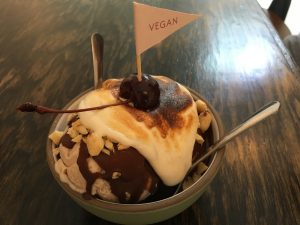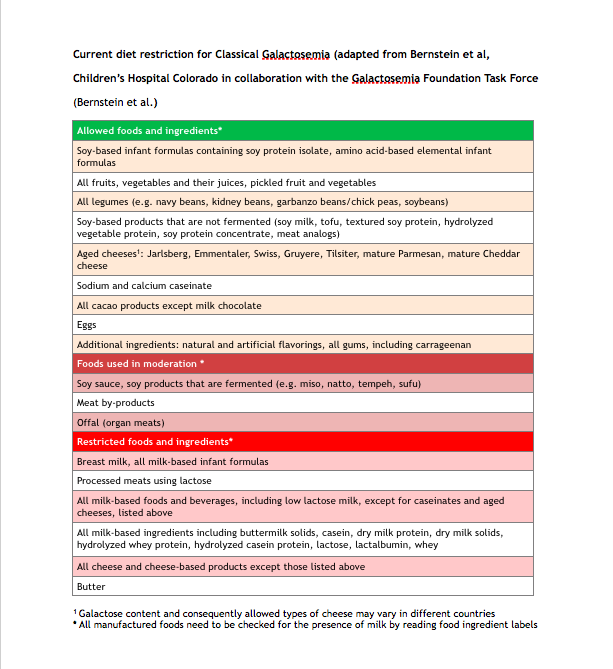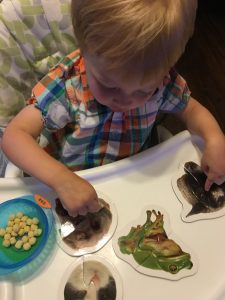I have always been a fan of the spirit of Halloween. The idea of people – young and old alike – embracing a little whimsy for a night (or a week or two as the case may be) has always reserved a special little spooky place in my heart.

Ollie’s choice for his first trick-or-treat night.
Halloween is a little tougher for us now that we are managing Oliver’s galactosemia. Not only is it a celebration that largely revolves around candy, much of which contains dairy, but it also serves as the unofficial kickoff for what is essentially an entire season of holidays centered around gatherings at the table and food-centric parties and events. Thanksgiving, Hanukkah, Festival of the Seven Fishes, Diwali, Christmas – there are no shortage of food landmines to skillfully navigate if you and/or a member of your family follows a restricted diet.
The desire to have our child still feel included and find joy over the next few months is an added layer of stress during what can already be a stressful time.
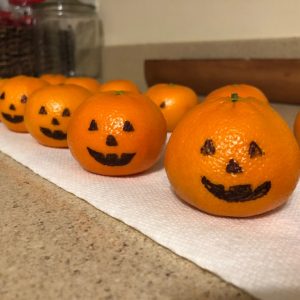
A little dairy-free treat for O’s preschool class
This was the first year Ollie actually traveled door-to-door for trick-or-treat night and here are a few strategies we implemented to try to ensure a successful and fun Halloween:
- Manage expectations. Even at almost three years old, Ollie has already started to be able to identify things he can and cannot eat. When we walk by the dairy case at the grocery store, he will usually point over to the regular section of milk and wag a finger back and forth announcing, “No cow milk!” So in the lead up to trick-or-treating, we have not only talked about the procedure to expect (knock on door; say “trick or treat”; get candy; say “thank you”; rinse and repeat) but we also reminded Ollie that a lot of what he might get in his bucket will have milk in it and therefore he won’t be able to eat.
- Prepare for the switcheroo. A few years ago I read about the concept of the “Switch Witch.” The idea seems to have been developed as a way to curb kids’ post-Halloween sugar consumption but has also been adopted by some families with food allergy and sensitivity issues, dental concerns, and other health conditions that can be impacted by diet. Not unlike the Tooth Fairy, the kiddo leaves a little something behind for the Switch Witch – some or all of his candy haul in this case – and the Witch comes in the middle of the night and exchanges it for a toy or gift. Leading up to Halloween night, we would casually remind Ollie so it was not a big surprise for him when we got home and there was a little basket waiting to receive his candy gift for the Switch Witch later that night.
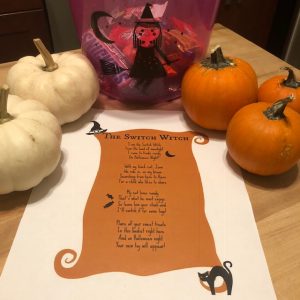
Before the Switch Witch cometh…
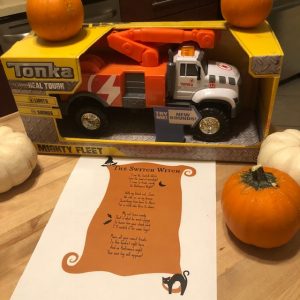
…and after
- Have replacements ready. Not only can Ollie not have most chocolates and caramel, but because of his age and the risk of choking, we still avoid most hard candies, gum, and things with whole nuts. That knocks out a lot of Halloween candy, so we made sure to pick up a small bag of galactosemia friendly candy so that if he happened to only receive candy he couldn’t eat, we would have backups to slip into his bucket to at least fill in slightly what we had to take out. In the end, we left him with about a dozen pieces of candy to enjoy.
- Support the Teal Pumpkin Project. Started by FARE (Food Allergy Research and Education), the Teal Pumpkin Project encourages households participating in Halloween to also offer non-food items for children with food allergies. Although Oliver does not have a food allergy,* we consider ourselves allies to the food allergy community. We believe that food labeling and handling regulations, providing safe inclusivity of all children at school, restaurants, and elsewhere, and greater understanding and research into the causes of food allergies, benefits us all. That being said, the Teal Pumpkin Project not only serves families managing a food allergy, but also allows families with children dealing with a variety of other health issues, including galactosemia, enjoy the holiday a little more as well.
I won’t say that everything has been perfect. We’ve had our share of tears and hurt feelings this Halloween, but every day Ollie seems to understand a little bit more about what his condition means for everyday life and is learning to adapt and bounce back from difficult situations. And that’s really what it is all about for us.

Happy Halloween!
*I make this point not because there is anything wrong with having a food allergy, but because the distinction between food allergies and a metabolic condition like galactosemia is an important one. The consequences and short and long-term complications are very different for the two and it’s important for people in Ollie’s life to understand that.
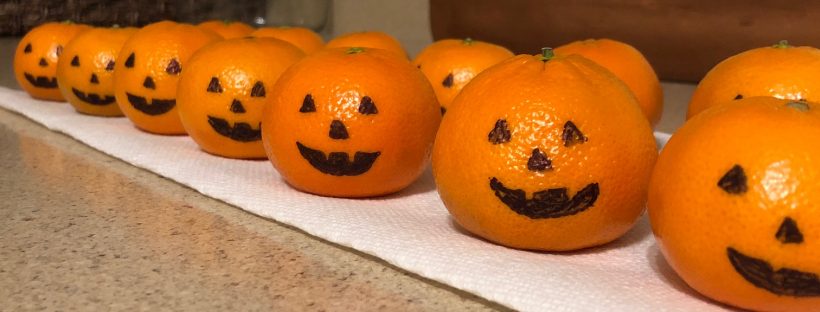
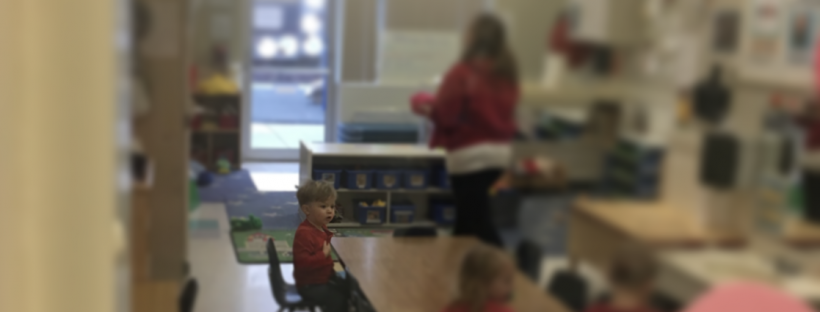
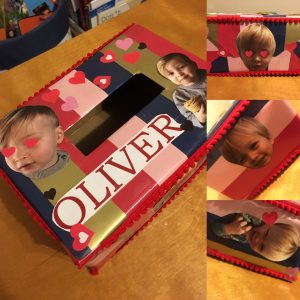
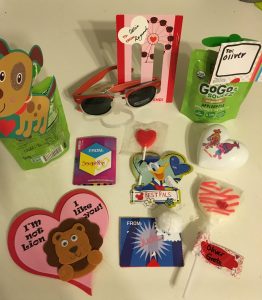
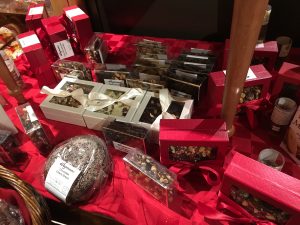
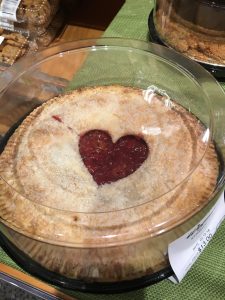
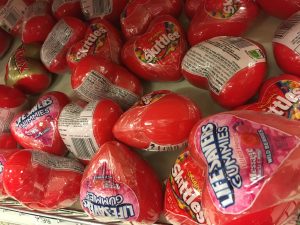
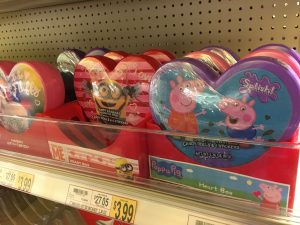

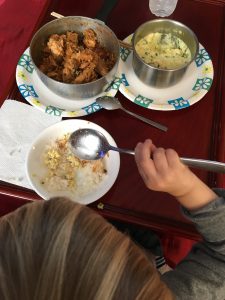
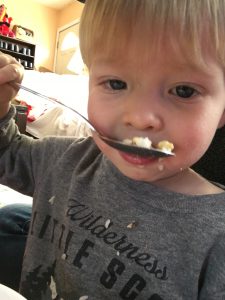
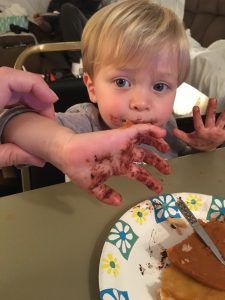 My family as a whole has been really supportive and accommodating when it comes to meals with Oliver. With only a few modifications, we were able to make our entire Thanksgiving dinner dairy-free (for the second year in a row)! The only item that we made special for John, Oliver, and myself was the gravy. (I have not perfected this recipe enough for others to find it to be an acceptable substitute for the real deal.) My sister, Tammy, who has always baked all of the holiday pies for the family, goes out of her way each year to make multiple pies that are dairy-free (apple, cherry, pumpkin), as well as dairy-free oreo balls which are a Lucy family favorite! She even makes sure to pick up dairy-free whipped topping so we do not miss out on any of the experience!
My family as a whole has been really supportive and accommodating when it comes to meals with Oliver. With only a few modifications, we were able to make our entire Thanksgiving dinner dairy-free (for the second year in a row)! The only item that we made special for John, Oliver, and myself was the gravy. (I have not perfected this recipe enough for others to find it to be an acceptable substitute for the real deal.) My sister, Tammy, who has always baked all of the holiday pies for the family, goes out of her way each year to make multiple pies that are dairy-free (apple, cherry, pumpkin), as well as dairy-free oreo balls which are a Lucy family favorite! She even makes sure to pick up dairy-free whipped topping so we do not miss out on any of the experience! Speaking of sweets! While we were with family, we celebrated Oliver’s birthday a little early. My other sister, Maria, was able to make the trek from New York and brought a special birthday cake for Ollie! A beautiful and absolutely delicious pareve cake from a kosher bakery in Queens. “Pareve” food items are prepared in accordance with Jewish law and mean that they contain no meat or dairy. You can also find lots of products in the grocery store labeled as “pareve” or “parve” and are marked with a “U” which generally means they are safe for a galactosemia diet. However, I always (always!) check the ingredient labels to be absolutely certain.
Speaking of sweets! While we were with family, we celebrated Oliver’s birthday a little early. My other sister, Maria, was able to make the trek from New York and brought a special birthday cake for Ollie! A beautiful and absolutely delicious pareve cake from a kosher bakery in Queens. “Pareve” food items are prepared in accordance with Jewish law and mean that they contain no meat or dairy. You can also find lots of products in the grocery store labeled as “pareve” or “parve” and are marked with a “U” which generally means they are safe for a galactosemia diet. However, I always (always!) check the ingredient labels to be absolutely certain.
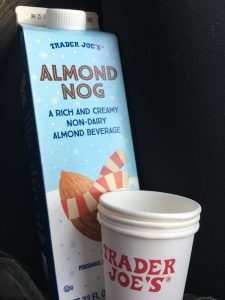
 Whether it be holiday parades where candy is being chucked at us from every direction, building gingerbread houses at school, or baking Christmas cookies for Santa, Oliver did it all this year! We are starting to explain certain things to him, even if he can’t quite grasp it all fully yet. “This candy has milk in it, so let’s have this other piece instead.” It helps us get in the habit of trying to educate him instead of just making choices for him. It is important for us that he understands the why as much as is age appropriate.
Whether it be holiday parades where candy is being chucked at us from every direction, building gingerbread houses at school, or baking Christmas cookies for Santa, Oliver did it all this year! We are starting to explain certain things to him, even if he can’t quite grasp it all fully yet. “This candy has milk in it, so let’s have this other piece instead.” It helps us get in the habit of trying to educate him instead of just making choices for him. It is important for us that he understands the why as much as is age appropriate.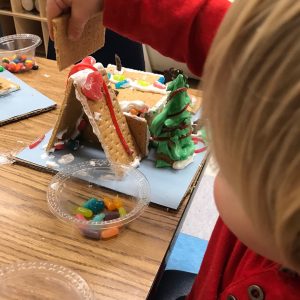
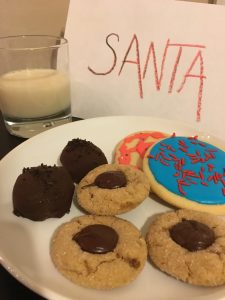
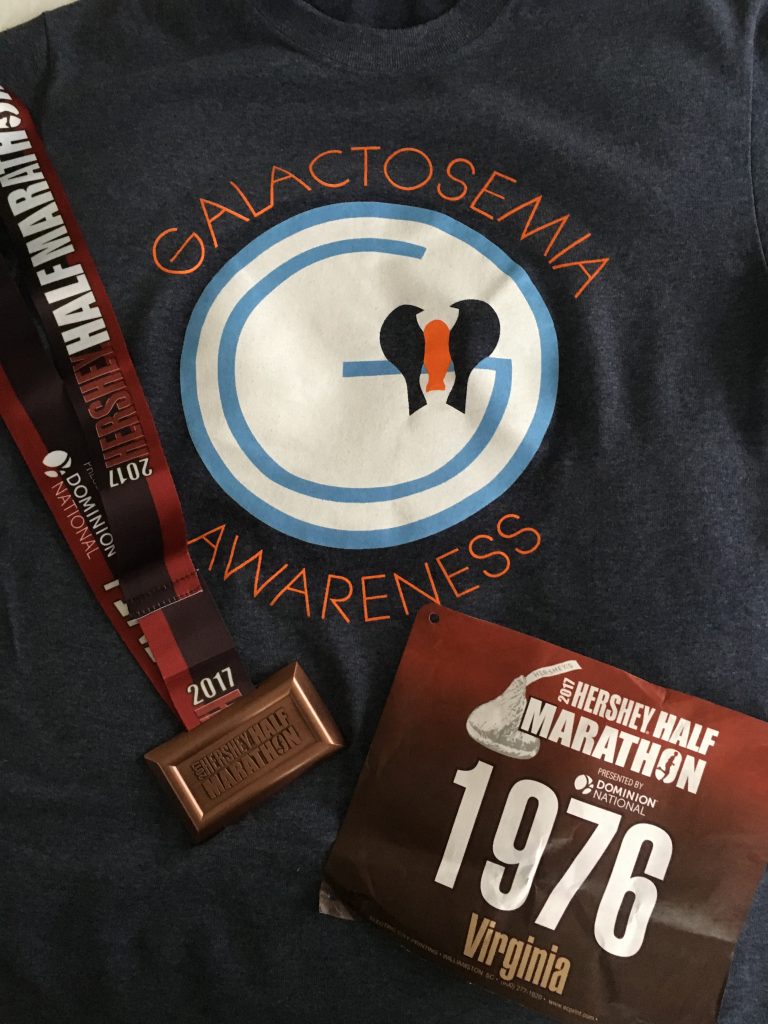

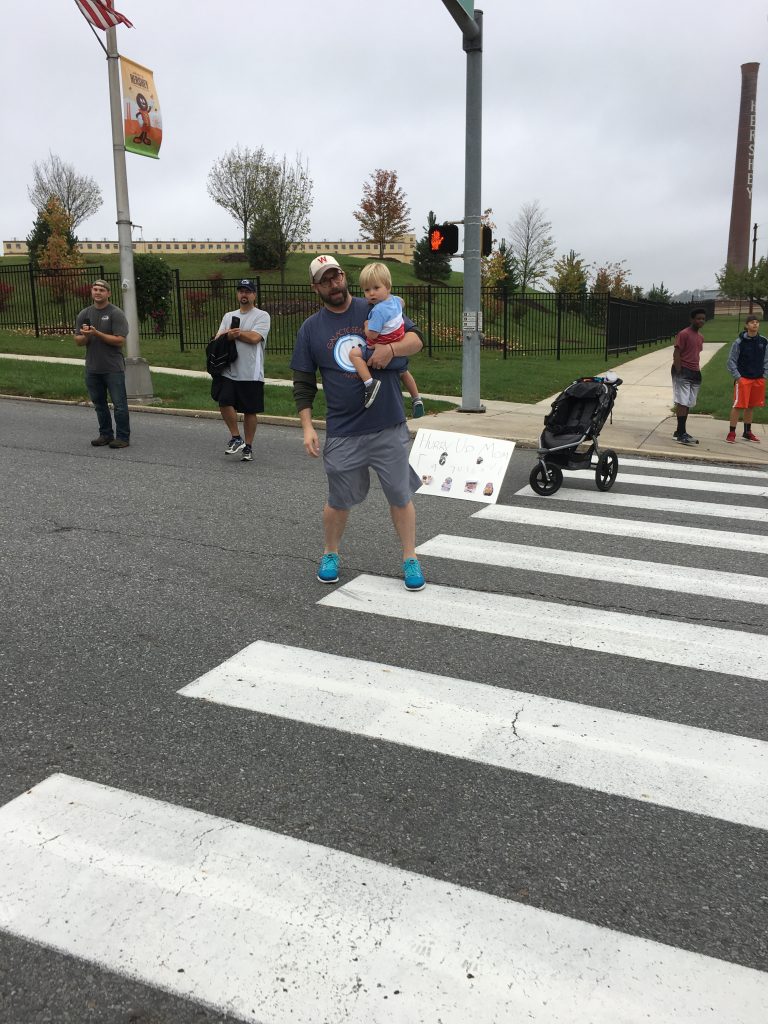
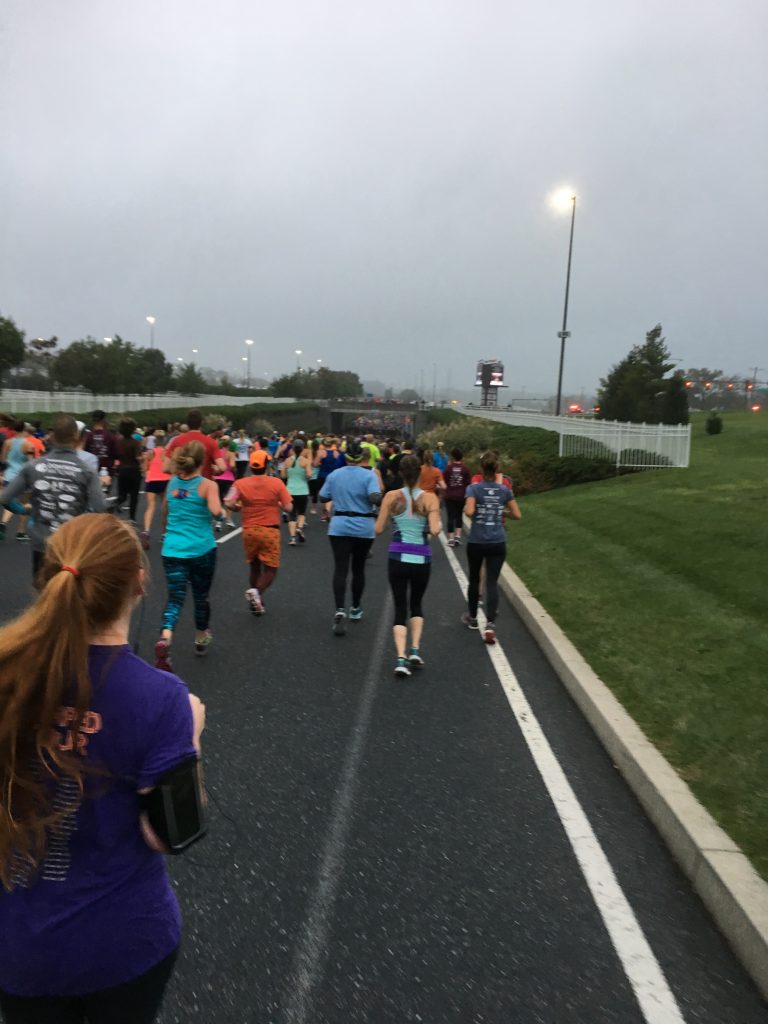
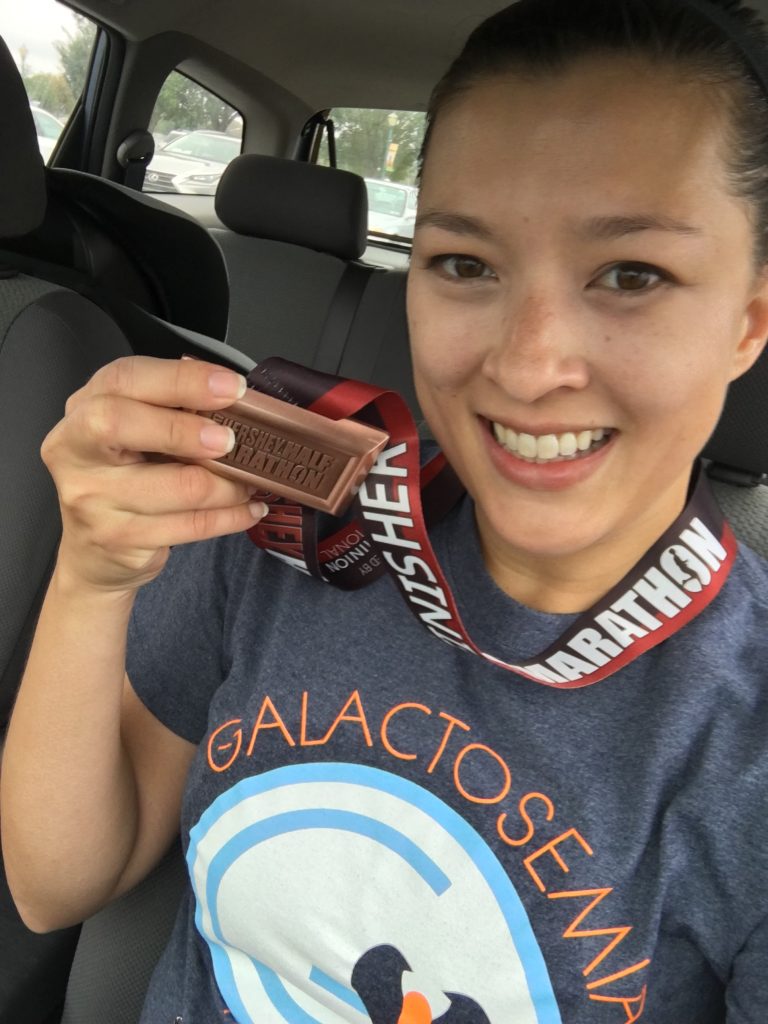
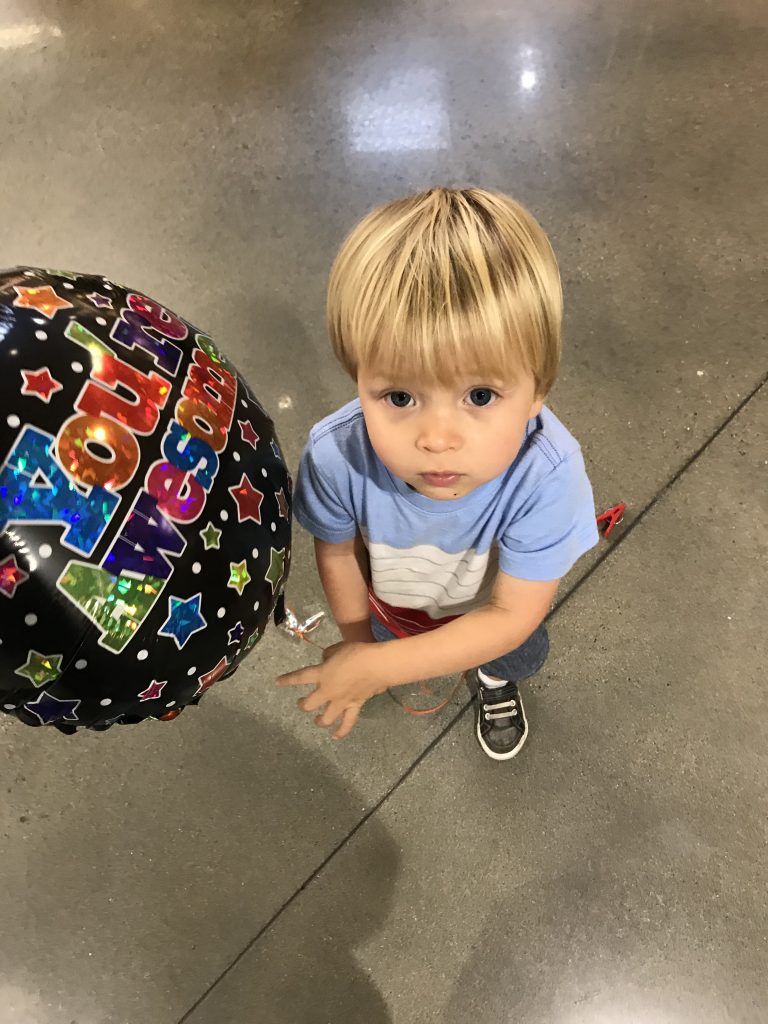

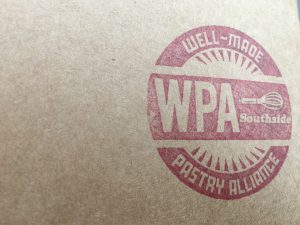 WPA Bakery has two locations, but we opted for the Church Hill locale. We made it there *just* before they closed. They are not exclusively vegan but every Sunday they offer vegan donut varieties.
WPA Bakery has two locations, but we opted for the Church Hill locale. We made it there *just* before they closed. They are not exclusively vegan but every Sunday they offer vegan donut varieties.
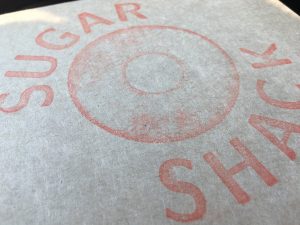 We have been to Sugar Shack on previous trips because they have always put themselves out there as vegan-friendly and have had a vegan option for quite a while. However, previously it was an alternative to their “regular” donuts and, if I remember correctly, they were more of a cake-style. Don’t get me wrong, they were amazing, but like I have said before, I have been hunting for a good vegan yeast donut for a while.
We have been to Sugar Shack on previous trips because they have always put themselves out there as vegan-friendly and have had a vegan option for quite a while. However, previously it was an alternative to their “regular” donuts and, if I remember correctly, they were more of a cake-style. Don’t get me wrong, they were amazing, but like I have said before, I have been hunting for a good vegan yeast donut for a while.
 I’ll be honest. When John first proposed this restaurant to me, I thought it looked a tad too fancy for us to roll up with Oliver. Even though he can be an adventurous eater, at 21 months, he is in full-on moody toddler mode most of the time. Unpredictable is an understatement. But we wanted to do some shopping in Carytown anyway, so we agreed to do a little fly-by and if the vibe wasn’t child-friendly, we had some back-up options in the area.
I’ll be honest. When John first proposed this restaurant to me, I thought it looked a tad too fancy for us to roll up with Oliver. Even though he can be an adventurous eater, at 21 months, he is in full-on moody toddler mode most of the time. Unpredictable is an understatement. But we wanted to do some shopping in Carytown anyway, so we agreed to do a little fly-by and if the vibe wasn’t child-friendly, we had some back-up options in the area.
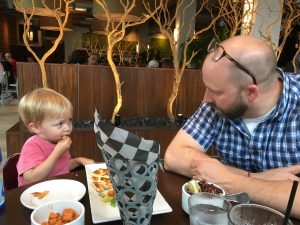
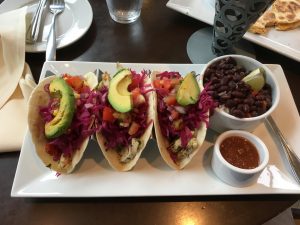
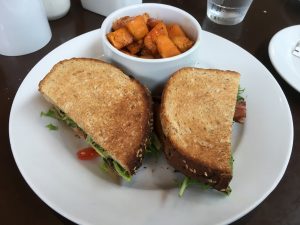
 Overall it was a really hearty meal and we felt confident we were ordering food that fits well with O’s diet. Best of all, Oliver definitely seemed to enjoy his meal!
Overall it was a really hearty meal and we felt confident we were ordering food that fits well with O’s diet. Best of all, Oliver definitely seemed to enjoy his meal! Oh, Charm School! Where have you been all my life? This delightful local ice cream shop is just so perfect to me. From its mint green doors and accents to the minimalist decor to its vegan ice cream options. There are no words to describe how much I love Charm School Social Club. (I mean, can we talk about their
Oh, Charm School! Where have you been all my life? This delightful local ice cream shop is just so perfect to me. From its mint green doors and accents to the minimalist decor to its vegan ice cream options. There are no words to describe how much I love Charm School Social Club. (I mean, can we talk about their  Baskin Robbins, it ain’t, and it is all the better for it. When we were there, they had about a dozen dairy ice cream flavors available, and another four or so vegan options. We chose the vegan sundae, which consists of two scoops, Magic Shell, vegan marshmallow fluff, nuts, and a cherry. We also had the option of vegan whipped “cream” but we did not see it in time so we did not get any #regrets.
Baskin Robbins, it ain’t, and it is all the better for it. When we were there, they had about a dozen dairy ice cream flavors available, and another four or so vegan options. We chose the vegan sundae, which consists of two scoops, Magic Shell, vegan marshmallow fluff, nuts, and a cherry. We also had the option of vegan whipped “cream” but we did not see it in time so we did not get any #regrets.